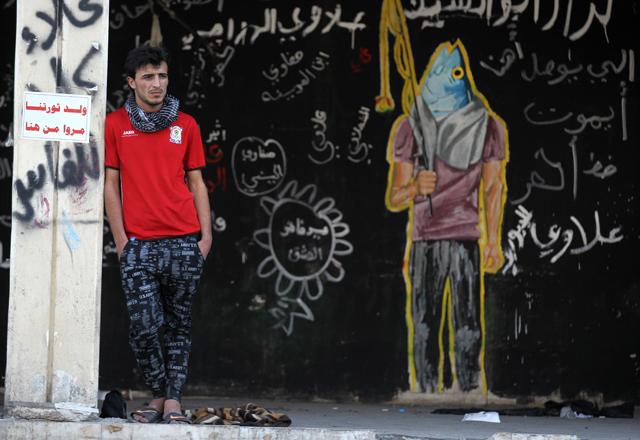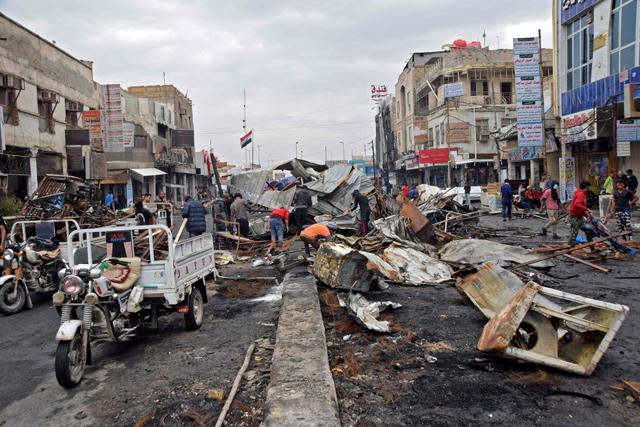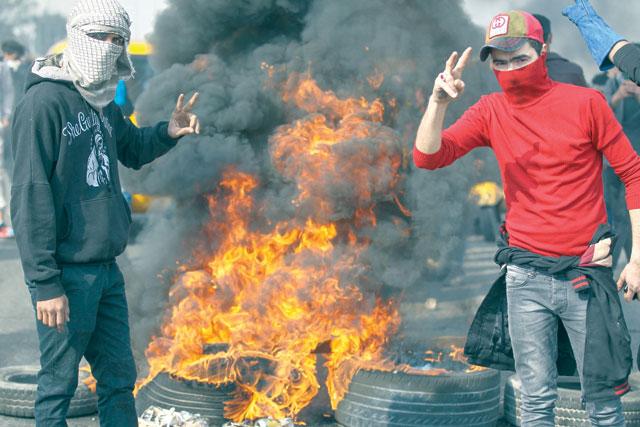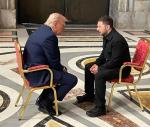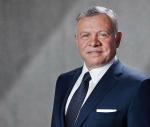You are here
Renewed violence against Iraq protesters as TV station suspended
By AFP - Jan 28,2020 - Last updated at Jan 28,2020
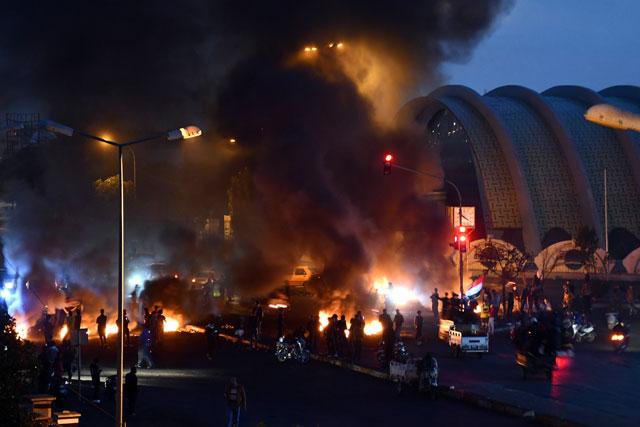
Iraqi anti-government demonstrators block a bridge with debris and burning tyres in the city of Nasiriyah in Iraq’s southern Dhi Qar province on Tuesday (AFP photo)
BAGHDAD — Two Iraqis were killed and dozens wounded in protest-related violence on Tuesday, as authorities suspended a television station which has broadcast intensive coverage of the months-long movement demanding regime change.
The youth-led campaign has pressed on despite violence that has killed more than 480 people, a vast majority of them protesters, since rallies erupted in Baghdad and Shiite-majority southern Iraq on October 1.
Demanding snap elections, an independent prime minister and accountability for long-standing corruption and bloodshed, youths have occupied squares, blockaded streets and boycotted university classes for nearly four months.
Security forces have responded with live rounds and tear gas, and on Tuesday one protester was shot dead in clashes with riot police in the southern protest hotspot of Kut, according to medical and security sources.
Further north in the capital, a professor at the famed Mustansariyah University was shot dead early Tuesday while driving in his car, medics and police said.
Mohammad Alwan was known to have been protesting in Tahrir Square, a plaza in central Baghdad which demonstrators have transformed into an anti-government tent city.
Activists have long complained that a campaign of kidnappings and drive-by shootings has aimed to intimidate them into calling off the protests.
‘We’ll protest every day’
Near Tahrir on Tuesday, protesters carrying makeshift shield tried to seal off roads and threw rocks at riot police firing tear gas and live rounds.
Around 15 protesters were wounded, medics said.
Other rallies and skirmishes rocked the port city of Basra in the south, as well as Amarah, Hillah and Nasiriyah.
“We came out today and we’ll protest every day to support these protests, which are a historic challenge,” said Ajwad Ali, a university-age protester in Nasiriyah.
“We renew our demands for a new prime minister and for the new electoral law to be signed into law. If there is more procrastination, we will escalate our peaceful movement.”
Political factions have thus far failed to agree on a replacement for the prime minister, Adel Abdel Mahdi, who resigned in December but has stayed on in a caretaker role.
And while parliament has passed a new law to oversee parliamentary elections, it falls short of protesters’ demands and has yet to be signed into law by the president.
The delays have infuriated protesters, and even Iraq’s top Shiite religious authority and the United Nations have criticised authorities for failing to enact reform.
The government has also come under fire for not doing enough to protect journalists in the country.
Iraqi authorities this week suspended Al Dijla television station for a month, media and police sources said Tuesday.
“Interior ministry forces fully shut down Al Dijla’s offices in Baghdad last night and respectfully asked the staff to leave,” a source from the broadcaster told AFP.
US ‘outraged’ at rockets
An interior ministry official confirmed that security forces had stormed the offices in east Baghdad late Monday.
The Al-Dijla employee said the station’s headquarters in Amman had even been ordered by Jordanian authorities to halt broadcasting, after Iraqi authorities filed a complaint.
Starting Monday, the frequency on which Al-Dijla typically broadcasts has showed a still image of its logo.
The channel has provided daily coverage of the anti-government protests, despite pressure on its staff.
Its Baghdad office was raided in the first week of rallies, one of its correspondents and his cameraman were gunned down in Basra and an anchorman was involved in an on-air row with the premier’s military spokesman.
The protests are playing out against a backdrop of heightened tensions between Iran and the US that have threatened to spill over into Iraqi territory.
Washington has blamed Tehran-aligned groups for a spate of nearly 20 rockets attacks against the US embassy in Baghdad and Iraqi bases where American troops are deployed.
The latest rocket attack on the US embassy on Sunday left one person wounded.
In a call to Abdel Mahdi, US Secretary of State Mike Pompeo “expressed his outrage at the continued assaults by Iran’s armed groups against US facilities in Iraq”, the State Department said in a statement.
Iraq’s foreign ministry earlier said the attack would not impact US-Iraqi relations, although Abdel Mahdi and parliament speaker Mohammed Halbusi said it risked dragging their homeland into a new war.
Related Articles
BAGHDAD — Anti-government demonstrations that erupted in Iraq on October 1 have escalated into its deadliest protest movement in decades, co
NASIRIYAH, Iraq — Anti-government protesters defied lockdowns and the threat of violence to demonstrate on Saturday in several Iraqi cities,
BAGHDAD — An Iraqi protester was killed in Baghdad on Tuesday, medics said, as angry young people reignited a three-month-old protest moveme


